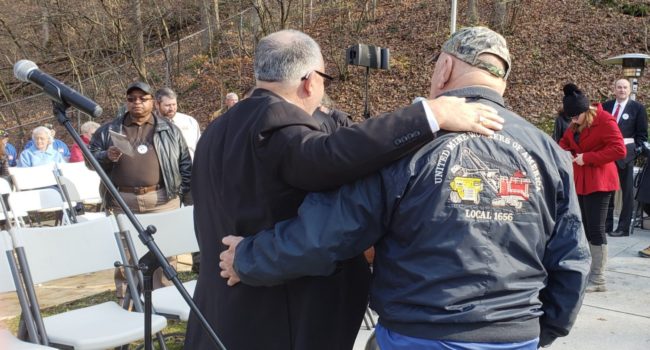Miners, Family Members Share Sadness and Gratitude 50 Years After West Virginia's Farmington No. 9 Disaster

By Alex Wiederspiel
November 19, 2018 - “Pray that it never happens to anyone again.”
Sharon Clelland was just five years old when she saw her father for the final time.
“We had went to bed, dad came and tucked me in like he always did,” she said. “Said he loved us and everything and said he’d see us when he got home from work. The next morning, we were all waiting for him to get home from work — us younger ones always had breakfast with him — and he never came home.”

UMWA District 31 VP Mike Caputo embraces a fellow union rep ahead of Sunday's memorial commemorating 50 years since 78 coal miners were killed at Farmington No. 9.
Photo by Alex Wiederspiel, Metro News
David Cartright was one of 78 killed in one of the most significant mine disasters in state history.
“Some people from the church came and told mom that there had been an explosion and that it was a possibility dad was taken,” she said. “And he was taken from us.”
50 years later, Clelland now regularly sings at the Farmington No. 9 annual memorial, a Sunday remembrance every November to commemorate the events of Nov. 20, 1968.
“It was very tough growing up as a child, not having a dad around for an image — father image,” she said.
Rev. Richard Bowyer, a campus minister at Fairmont State and a board member of the Fairmont Clinic, joined the medical team the day after the initial explosion. He remained there until the mine was sealed on November 29.
“Terribly moving moment,” he said. “The most memorable piece of that, and nobody was there with a recorder, was the prayer by the host pastor — Reverand John Barnes, now deceased. The most sensitive, caring, compassionate prayer I think I’ve ever heard.”
He added: “That probably stands out more than anything of that night.”
Famously, this disaster is inextricably linked to the passage of a sweeping series of reforms that empowered mine safety regulators and significantly improved mine safety. The Federal Coal Mine Health and Safety Act of 1969 was passed in response, though more than 60 years after the most deadly mine disaster in United States history took place some 15 miles southeast of Farmington No. 9 in tiny Monongah, West Virginia.
But Bowyer said the 1968 disaster was unique. Between the intensive media coverage, which was a first, and the large number of grieving widows who chose to take their pleas for safety reform to Washington D.C., quite suddenly a stark light had been cast upon the coal mining industry.
“It was so large in number, and so many families were affected,” he said. “And so the advocacy of the widows, and then others who joined in that cause has made a significant difference.”
21 of the 99 miners escaped — and only one survivor, the ailing Ralph Starkey (who could not attend the memorial Sunday), remains alive today. Meanwhile, remains of 19 of the 78 victims were never recovered — all part of a scar that may never truly heal. But Bowyer said the families were able to come together under the most difficult of circumstances and save thousands of future lives.
“Their compassion for one another, their concern, their conviction that mine health and safety is crucial for those who are directly involved, but also for the well-being of the country,” Bower said.
According to the Mine Safety and Health Administration (MSHA), since 1900, more than 104,000 miners have died from coal fatalities.
More than 95 percent of those deaths occurred before 1968.
Life was tough without her father, but in the aftermath Clelland said her mom stepped up.
“We wouldn’t trade our mom for anything in the world. She stuck right by us. She done the best that she could do to provide for us with what we had. It taught us how to appreciate what we have and not what we want.”
But Clelland, who has offered her singing voice to the ceremony for the past eight years, paused and began to tear up.
“It was just a very a hard time.”

